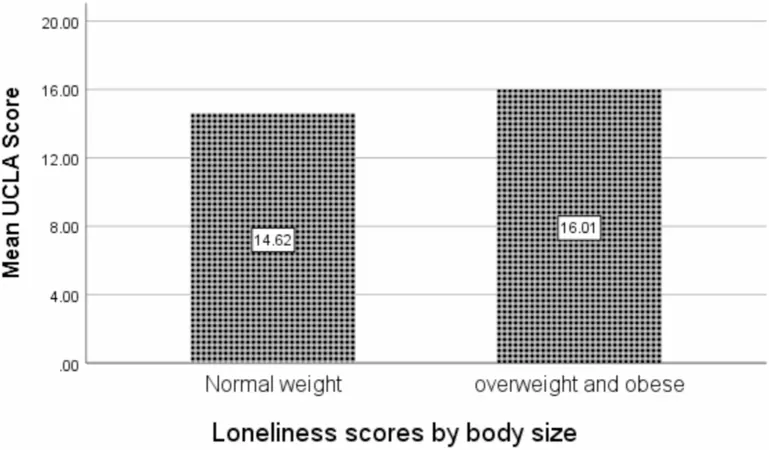
How Loneliness, Body Image, and Sleep Impact Workers in Southern China
2025-04-11
Author: John Tan
Unmasking Loneliness in a Fast-Paced World
As the pace of life accelerates, loneliness has emerged as a significant threat to mental well-being. Alarmingly, a vast study by the BBC revealed that 40% of young adults globally reported feelings of loneliness. Among older adults, particularly those over 75, this number fell to 27%. In China, studies mirror these findings, showing that approximately 28% of seniors experience loneliness. Such isolation poses severe risks, including declining physical health and rising rates of anxiety and depression.
The Interconnections: Body Image and Loneliness
Loneliness often stems from perceived inadequacies in social connections. Interestingly, it is frequently linked to negative body image, which can diminish confidence and hinder social interactions. Those wrestling with body dissatisfaction may feel ashamed, leading to increased isolation. This underscores the crucial need to foster a positive body image to combat loneliness.
The Role of Body Image Flexibility
Body image flexibility—the capacity to accept one's body without negative judgments—also plays a pivotal role in mitigating loneliness. Recent research shows that higher flexibility correlates with better mental health. Those who can cope with negative body perceptions tend to experience lower levels of psychological distress, suggesting body image flexibility could be key in predicting loneliness.
How Body Size Influences Feelings of Isolation
Studies show a concerning trend: individuals with obesity often grapple with negative body image and consequently face increased loneliness. Notably, a Chinese study indicated that those with higher body mass index (BMI) reported greater dissatisfaction with their body image. Thus, the relationships between body size, self-esteem, and social interactions are deeply intertwined.
The Sleep-Loneliness Connection
Sleep is vital for both physical and mental health. Recent research implicates sleep deprivation in fostering feelings of loneliness. A study indicated that socially active individuals enjoy better sleep quality, while lack of sleep can lead to avoidance of social engagements, worsening feelings of isolation. With significant sleep deprivation rates reported among Chinese adults, its role in exacerbating loneliness cannot be overlooked.
A New Focus on Middle-Aged Workers
While much research has centered on adolescents and seniors, middle-aged individuals—especially factory workers under tremendous societal pressure—have not been adequately studied. However, findings show a peak in loneliness experiences at around 47 years old, indicating this demographic is particularly vulnerable to feelings of isolation amid rapid societal changes.
Key Findings: Linking Body Image and Loneliness
Among workers in Southern China, those with higher BMI levels reported increased loneliness, not merely due to body size but significantly impacted by societal weight stigma. In stark contrast to Western perspectives on body image, where weight comments are often deemed harassment, Asian culture often normalizes weight teasing, linking it to lowered self-esteem.
Boosting Body Appreciation to Combat Loneliness
Encouragingly, higher body appreciation correlates with reduced feelings of loneliness. Studies show that individuals with a healthier self-view are more resistant to societal pressures and stressors that can negatively affect social interactions. Promoting body appreciation, particularly among those at risk of poor self-image, could be a powerful intervention.
Gender Dynamics in Body Image
Interestingly, our analysis revealed that males typically scored higher in body appreciation, while females demonstrated greater flexibility regarding body image. The societal pressure on women to conform to narrow beauty standards often leads to critical self-perception, resulting in dissatisfaction and isolation. In contrast, men are socialized to view their bodies as symbols of strength, leading to higher self-esteem.
Looking Ahead: Implications for Future Research
Our findings underscore the pressing need for interventions targeting societal attitudes towards body image, emphasizing both body appreciation and flexibility. By addressing the intricacies of loneliness related to body image, society can foster improved mental health outcomes, especially in vulnerable populations.
Limitations and Future Directions
While these findings are enlightening, the study's limitations include a relatively small sample from the southern region of China, restricting broader generalizations. Future research should expand this inquiry across diverse populations to comprehensively understand these complex relationships.


 Brasil (PT)
Brasil (PT)
 Canada (EN)
Canada (EN)
 Chile (ES)
Chile (ES)
 Česko (CS)
Česko (CS)
 대한민국 (KO)
대한민국 (KO)
 España (ES)
España (ES)
 France (FR)
France (FR)
 Hong Kong (EN)
Hong Kong (EN)
 Italia (IT)
Italia (IT)
 日本 (JA)
日本 (JA)
 Magyarország (HU)
Magyarország (HU)
 Norge (NO)
Norge (NO)
 Polska (PL)
Polska (PL)
 Schweiz (DE)
Schweiz (DE)
 Singapore (EN)
Singapore (EN)
 Sverige (SV)
Sverige (SV)
 Suomi (FI)
Suomi (FI)
 Türkiye (TR)
Türkiye (TR)
 الإمارات العربية المتحدة (AR)
الإمارات العربية المتحدة (AR)